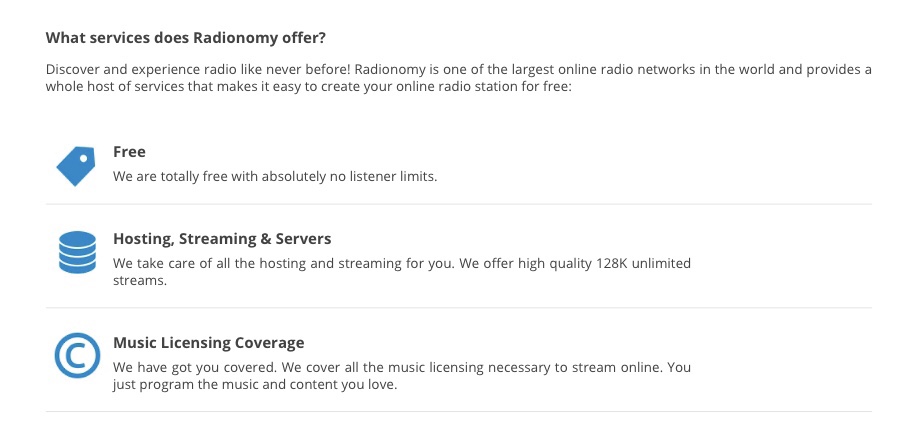After the demise of the first incarnation of Live365 in 2016, European streaming platform Radionomy remained the last platform to offer free streaming to internet radio stations. However, the writing was already on the wall earlier this year when Radionomy left the U.S. market. Though not confirmed, one might conjecture this was a result of a lawsuit filed in 2016 by major record labels – including Arista and Sony Music – alleging the platform had failed to pay U.S. statutory performance royalties since “late 2014.”
Now Radionomy announces it is fully shutting down worldwide. In its place, the company is offering to migrate stations over to Shoutcast for Business. Recall that Radionomy acquired the stalwart online radio platform along with the longstanding Winamp MP3 and internet radio player app in 2014 from AOL, which otherwise was ready to shut it all down.
As RAIN News notes, a big difference between Radionomy and Shoutcast is that the former purported to cover performance royalties (the same ones it was sued over charges it hadn’t paid). In the U.S. if your station uses Shoutcast and plays music then you need to take care of royalty payments to SoundExchange separately, on your own.
 Prior to closing, Radionomy offered completely free radio stream hosting, music licenses covered, with no limits on audience size. The trade-off for broadcasters was that they had to accommodate a few minutes of ads per hour, and stations with tiny listenerships risked being cut off.
Prior to closing, Radionomy offered completely free radio stream hosting, music licenses covered, with no limits on audience size. The trade-off for broadcasters was that they had to accommodate a few minutes of ads per hour, and stations with tiny listenerships risked being cut off.
Now, there are still a number of companies offering free internet radio hosting, however it is up to broadcasters to secure the proper royalties in their home countries. Of course, if your station only airs talk programming with no copyrighted music – that includes even music used in bumpers or to fill time – then you’re in luck. But if you play any music at all, then you’re on the hook for royalties.
At least in the U.S., the thing to note about royalties is that it’s up to the broadcaster to proactively contact SoundExchange, ASCAP or BMI to begin payment. Conceivably you could start broadcasting tomorrow without doing so, but the risk is that once one of the rights organizations finds you, they’ll hound you – or maybe even sue you – until you pay up.
The Final End of an Era
This seems like a logical end to a sequence of events that began in 2016, when the Small Webcaster Settlement Act expired, ending a 14 year period where small and hobbyist internet broadcasters paid discounted royalty rates intended to reflect their mostly low-revenue and effectively non-profit nature. While services like the revived Live365 still offer turn-key hosting that covers music licensing, the costs begin at about $59 a month or $708 a year. Certainly this is less expensive than a lot of hobbies (golf?) – and less expensive than operating a licensed broadcast station – it’s still prohibitively expensive for many would-be internet broadcasters interested in creating the kind of niche, underground or community-focused stations that the internet should be a natural home to.
I do want to point out that the costs are not Live365’s fault. Royalty payments are fixed and unavoidable, and hosting live radio streams costs them money. It’s great that a company like this is available for those who can take advantage, but it must be noted that not all can do so.
To me, the irony is always that it’s free to upload hundreds of hours of video to YouTube or broadcast endless hours of live streams. It’s ironic because it’s far more costly to stream high-bandwidth HD video than the comparatively tiny internet radio streams. But one of the world’s largest companies (Google) never chose to essentially underwrite a robust independent internet radio ecosystem, just video.
Though there are “pirate” radio broadcasters on YouTube who flout copyright restrictions, it’s a game of cat and mouse to stay in operation. YouTube does have agreements with music labels to allow some videos to contain copyrighted music, but not all songs and artists are covered, and using such music can impact a YouTuber’s ability to generate revenue on the platform.
The New Radio Pirates Don’t Pay Royalties
At various points in the last 20 years, internet radio has been trumpeted as the next, legal, incarnation of “pirate radio.” That’s more due to the lack of formal licensing requirements and lack of indecency restrictions than anything else. But the death of reasonable royalty rates means that dream of “legal” pirate radio is over.
That said, a broadcaster that streams music without paying royalties is ostensibly a pirate. So maybe the new radio pirates are ones that set up streams and don’t bother to pay royalties. Just like terrestrial pirates, they would take measures to obscure their identities and where they’re streaming from in order to make it hard for SoundExchange or BMI to track them down and send a bill. Assuming they’re successful in avoiding identification, their biggest risk is having their host shut down their stream. Of course, just like the terrestrial pirate who loses one transmitter to the FCC while remaining on the run, it’s just a matter of finding a new host or streaming server to get back on the tubes.
My question: do these new pirates exist? Or does the seemingly omniscient surveillance and tracking of the internet make a private enforcement authority seem more threatening than any FCC or Ofcom?



